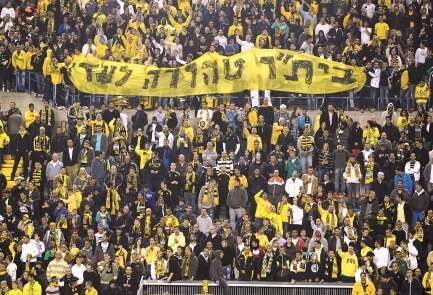A large group of Jerusalem soccer supporters fed up with the behavior of their fellow fans have turned their backs on the club they followed and set up a friendlier, more tolerant club.
Around 4,000 fans who were previously loyal to Beitar Jerusalem, one of Israel's biggest and best-supported clubs, have broken away to follow Beitar Nordia, which was formed by a small group of former Beitar Jerusalem fans four years ago.
Beitar Jerusalem is a bastion of Israel's political right-wing and a group of its supporters known as "La Familia" has been openly hostile and violent toward fellow fans. Israel's Arab minority has been the main object of their hatred.
While Beitar Jerusalem's players have worked to deliver success on the field, the La Familia supporters have often frustrated those efforts through their misconduct.
The club has faced disciplinary action numerous times, including fines and points deductions, and even had to play matches without the presence of fans for offenses including fan violence, the use of flares, pitch invasions and racist chanting.
Unlike almost all other Israeli soccer clubs, Beitar Jerusalem has never employed an Arab player.
Nordia, which has adopted the same yellow and black colors and the same team emblem, has taken completely the opposite attitude. Since it was founded it has fielded four Arab players and even has Arab fans.
Team captain Tzion Zaken, a former Beitar Jerusalem player, said the Nordia setup was unique because of its drive against racism and violence.
"Beitar Nordia is the only Israeli club I know that has formed to fight racism. Elsewhere, fans have rebelled because they didn't like the way their team was run, but Nordia is unique," he said.
Now making a bigger effort to curb the fan violence after another incident last month, Beitar Jerusalem ordered the east stand at Jerusalem's Teddy Kollek Stadium, where the most fanatical supporters sit, to be closed until further notice.
"The club feels disgusted by the violence, and even more so by the racism, and from now on it will battle those fans who wantonly harm the club," the club said in a statement, after a 4-2 home victory over Israeli-Arab club Bnei Sakhnin.
Aviv Sharfstein, a member of Nordia's management, said the club hopes to persuade the violent Beitar fans to abandon their militancy so that the two clubs may perhaps merge.
However, this appears unlikely in the short term, as Beitar Jerusalem has a far larger fan base and is a Premier League high-flyer, while Nordia is a relative upstart and a third-division midtable minnow.
Sharfstein said Nordia's supporters felt alienated because of the Beitar fans and the only course open to them was to form a separate club.
"We could no longer agree to hear the club narrative when fans used violence and displayed their racism by shouting 'Death to Arabs,'" he said.
"We felt we were going to matches alongside criminal organizations, they even used violence against us, the ordinary fans."
Taer Zaro, a resident of the Palestinian neighborhood of Beit Hanina in east Jerusalem who is studying physical education at Israel's Wingate Sports Institute, said he was happy to support Nordia and had found conviviality among his fellow fans.
"I was a supporter of Beitar Jerusalem when I was a boy and I only cared about the play on the pitch, and I was not interested in what the racist fans were saying, but I moved to support Nordia because I didn't want any part of the racism," Zaro said.
Elite Mazeh, a mother of three and also a member of the team's management who regularly takes her young children to games, said the club was open to all players.
"At Nordia, racism and violence do not exist. We accept anyone, including Muslim players," she said.
Zaken, 36, said he was happy to end his playing days at the club.
"The Nordia crowd are a positive group. I didn't know that there was such a good fan base when I played at Beitar and I'm happy to be part of it. The negative influence of La Familia is totally eclipsed by the positive fans here," he said.




